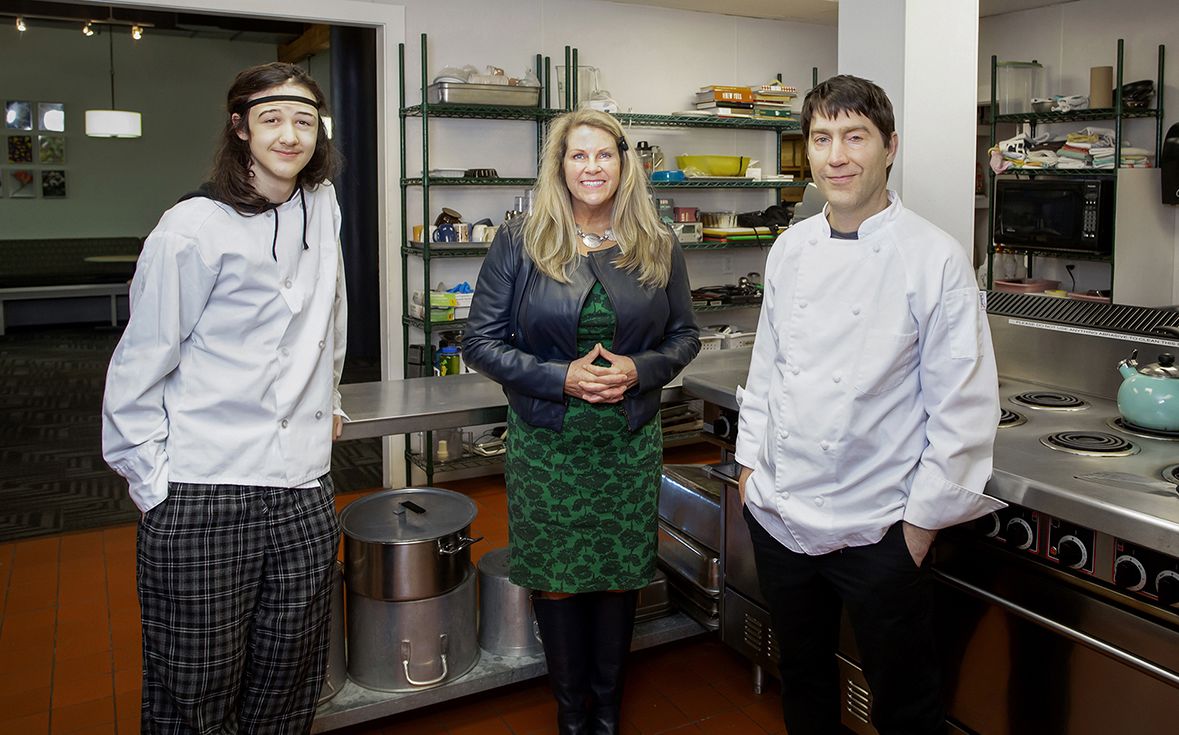Kitchen skills build confidence: A nonprofit offers training for restaurant jobs
 Photo / Tim Greenway
Donna Dwyer, president and CEO of My Place Teen Center, says teens today face a range of challenges, but training them for jobs increases their chances of success.
Photo / Tim Greenway
Donna Dwyer, president and CEO of My Place Teen Center, says teens today face a range of challenges, but training them for jobs increases their chances of success.
For years, a nonprofit in a renovated church in Westbrook has served as a beacon for children and teenagers in Cumberland and York counties needing a space to safely be themselves when school isn’t in session. Some come for tutoring or other resources, while others simply need a hot meal and a place to do homework.
But one program at My Place Teen Center aims not just to fulfill these kids’ current needs and build up their confidence but to help build a foundation for potential success working in restaurants — a goal shared with Maine’s restaurant industry, desperate to find ways to attract and retain workers after aspects of the pandemic upended the ability to find consistent, interested employees.
Teens and children in the program are taught valuable, hands-on techniques for working in the kitchen, like knife skills and measuring ingredients, although volunteers help knock out much of the cutting while students are still in school.
The nonprofit also tries reinforcing positive “soft skills,” like communication and problem-solving, useful both for working with customers and coworkers. Together, they help create and serve themselves a full, nutritious meal, often with produce and food products donated by Maine farms or foodmakers.
While any child can come to My Place Teen Center, the nonprofit primarily aims to benefit at-risk youth, which Donna Dwyer, the organization’s president and CEO.
The center’s programs are aimed at any child without “an appropriate adult role model in their life,” Dwyer says.
She adds that many of the kids in the program face “more excessive risk factors beyond that,” including poverty, health issues, chronic hunger and insecure access to housing.
The restaurant training program has evolved over the past few years.
“It’s been in some version of itself for five years, but its best version of itself really came within the past two to three years, it evolved,” says Dwyer.
That’s in part because My Place Teen Center has hired professional chefs — like Mac Waybright, the nonprofit’s youth culinary program instructor — to both help feed the kids and teach them best kitchen practices.
Jack Richards, a 15-year-old Westbrook resident, has been spending some time at My Place Teen Center and participating in the program for about two months. So far, he has learned how to make chicken with rosemary and balsamic vinegar, as well as meatballs with sauce, from scratch.
Richards has trouble sleeping through the night, often falling asleep during the school day. When he started attending the training program, he worried it would interfere with his trying to catch up on sleep after school. Things have changed now.
“It’s nice to actually have something to do instead of laying down the whole day,” he says. And the restaurant training program has him thinking about an after-school job at a local burger restaurant.
That’s the kind of story that Kathryn Ference, the workforce development director for the Maine Tourism Association, and others eager to see more people view the restaurant industry as a career want to hear.
When the pandemic hit and workplace safety and satisfaction plummeted, many left the restaurant industry and haven’t looked back since, says Ference. Employment in the state’s leisure and hospitality industry as a whole in December 2021 was up 9.6% from the year prior but was “still the lowest level of employment in the industry in Maine since 2005,” she added.
But the problem didn’t necessarily start with the pandemic, although the public health crisis certainly exacerbated and exposed the issue to customers.
“If you weren’t in the industry, you might be under the impression that before the pandemic, there were absolutely no problems with hiring and everything was perfectly hunky dory and you could just find people,” says Ference in an interview. “It’s not something that was widely publicized or widely known pre-pandemic, but the industry in Maine has been having a hard time finding enough people to work its positions for years now.”
Recruitment and retention issues have led over 60% of Maine accommodations and food services companies to raise wages or award bonuses since the pandemic began, explained Ference, citing the U.S. Bureau of Labor Statistics. Few are raising benefits, she added.
Of course, the industry’s poor reputation as a healthy workplace will likely take more than increased wages. Bo Jennings, the general manager of Bar Harbor’s Side Street Café, noted that more people are prioritizing their mental health. He pointed to Olympic athlete and gymnast Simone Biles’ decision to walk away from a potential medal to focus on her mental health.
“She was willing to walk away to protect her own mental health, so if someone’s willing to do that for a gold medal, they’re willing to do that for their [restaurant industry] job as well,” says Jennings. Encouraging work-life balance, schedule flexibility and feeling supported in the workplace can go a long way to build loyalty among restaurant staff and give them reasons to stay.
While a program like this might help in some way minimize or help reverse the trend of a shortage of restaurant industry workers, Waybright says “that’s not necessarily the point” of My Place Teen Center’s program.
“What it really is about is … who are they going to become at 20, 25 years old?” says Dwyer.
She added, “We just feel a profound sense of responsibility to do everything we can that is wholesome, that is pertinent, that is loving, that is savvy, to make an impact on their lives now and for their future. That is the point.”









0 Comments